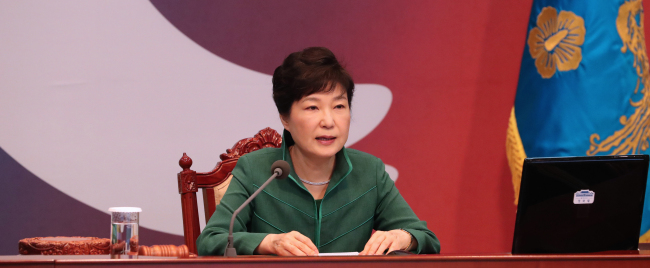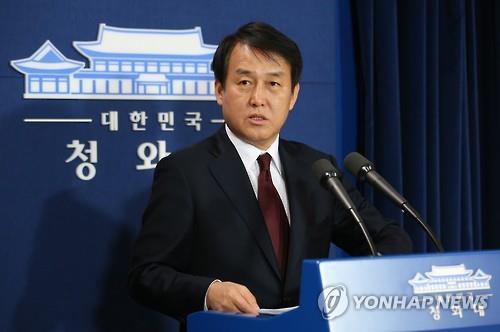The presidential office Cheong Wa Dae on Wednesday dismissed suspicion that President Park Geun-hye's plan to meet lawmakers representing part of the country's southeastern region may be related to the ruling Saenuri Party's leadership race slated for next week.
Cheong Wa Dae has been coordinating with lawmakers representing Daegu and North Gyeongsang Province to schedule a meeting as the president seeks to solicit their views on the planned deployment of an advanced U.S antimissile system in the country by late 2017.
Some observers have raised suspicion that during the meeting, Park and the lawmakers could discuss ways to pool support for a candidate that the chief executive favors. The election is slated for next Tuesday.
 |
President of South Korea, Park Geun-hye (Yonhap) |
"The planned meeting is intended to listen to public views on state affairs, (not to discuss the leadership contest)," presidential spokesman Jung Youn-kuk told reporters.
A former Saenuri leader criticized Park's plan to meet lawmakers as the "wrong" move.
"I think her pursuit of a meeting with lawmakers from a particular region ahead of the party convention is wrong," Rep. Kim Moo-sung told reporters. Kim who has been at odds with the president has been seen as trying to build up his own support base within the party ahead of next year's presidential race.
During a Cabinet meeting on Tuesday, the commander-in-chief said that she would make active efforts to address complaints from the residents in the southern town of Seongju, the site where Seoul and Washington have agreed to install a Terminal High Altitude Area Defense battery.
 |
Photo taken April 14, shows presidential spokesman Jung Youn-kuk speaking during a press conference at the presidential office Cheong Wa Dae in Seoul. (Yonhap) |
Residents in the town have strongly opposed the deployment plan, concerned that THAAD's powerful radar system could pose health risks and hurt their agricultural crops. Seoul officials have called such concerns misplaced.
Strong opposition also comes from those who are worried about the possible negative impact of the deployment on the relations with China and Russia that argue THAAD would escalate regional military tensions and hurt their security interests. (Yonhap)






![[Exclusive] Hyundai Mobis eyes closer ties with BYD](http://res.heraldm.com/phpwas/restmb_idxmake.php?idx=644&simg=/content/image/2024/11/25/20241125050044_0.jpg)
![[Herald Review] 'Gangnam B-Side' combines social realism with masterful suspense, performance](http://res.heraldm.com/phpwas/restmb_idxmake.php?idx=644&simg=/content/image/2024/11/25/20241125050072_0.jpg)

